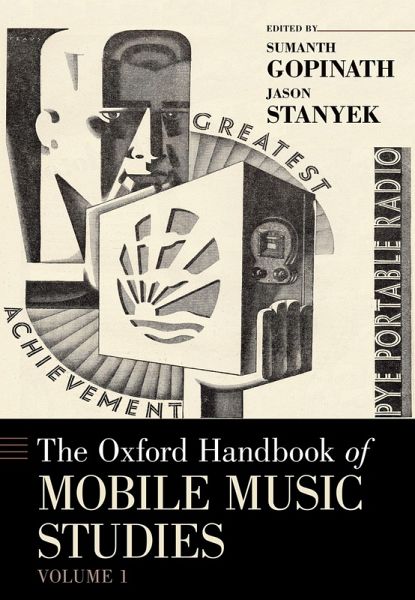
The Oxford Handbook of Mobile Music Studies, Volume 1 (eBook, PDF)

PAYBACK Punkte
9 °P sammeln!
The two volumes of The Oxford Handbook of Mobile Music Studies consolidate an area of scholarly inquiry that addresses how mechanical, electrical, and digital technologies and their corresponding economies of scale have rendered music and sound increasingly mobile-portable, fungible, and ubiquitous. At once a marketing term, a common mode of everyday-life performance, and an instigator of experimental aesthetics, "mobile music" opens up a space for studying the momentous transformations in the production, distribution, consumption, and experience of music and sound that took place between the ...
The two volumes of The Oxford Handbook of Mobile Music Studies consolidate an area of scholarly inquiry that addresses how mechanical, electrical, and digital technologies and their corresponding economies of scale have rendered music and sound increasingly mobile-portable, fungible, and ubiquitous. At once a marketing term, a common mode of everyday-life performance, and an instigator of experimental aesthetics, "mobile music" opens up a space for studying the momentous transformations in the production, distribution, consumption, and experience of music and sound that took place between the late nineteenth and the early twenty-first centuries. Taken together, the two volumes cover a large swath of the world-the US, the UK, Japan, Brazil, Germany, Turkey, Mexico, France, China, Jamaica, Iraq, the Philippines, India, Sweden-and a similarly broad array of the musical and nonmusical sounds suffusing the soundscapes of mobility. Volume 1 provides an introduction to the study of mobile music through the examination of its devices, markets, and theories. Conceptualizing a long history of mobile music extending from the late nineteenth century to the present, the volume focuses on the conjunction of human mobility and forms of sound production and reproduction. The volume's chapters investigate the MP3, copyright law and digital downloading, music and cloud computing, the iPod, the transistor radio, the automated call center, sound and text messaging, the mobile phone, the militarization of iPod usage, the cochlear implant, the portable sound recorder, listening practices of schoolchildren and teenagers, the ringtone, mobile music in the urban soundscape, the boombox, mobile music marketing in Mexico and Brazil, music piracy in India, and online radio in Japan and the US.
Dieser Download kann aus rechtlichen Gründen nur mit Rechnungsadresse in A, B, BG, CY, CZ, D, DK, EW, E, FIN, F, GR, HR, H, IRL, I, LT, L, LR, M, NL, PL, P, R, S, SLO, SK ausgeliefert werden.













